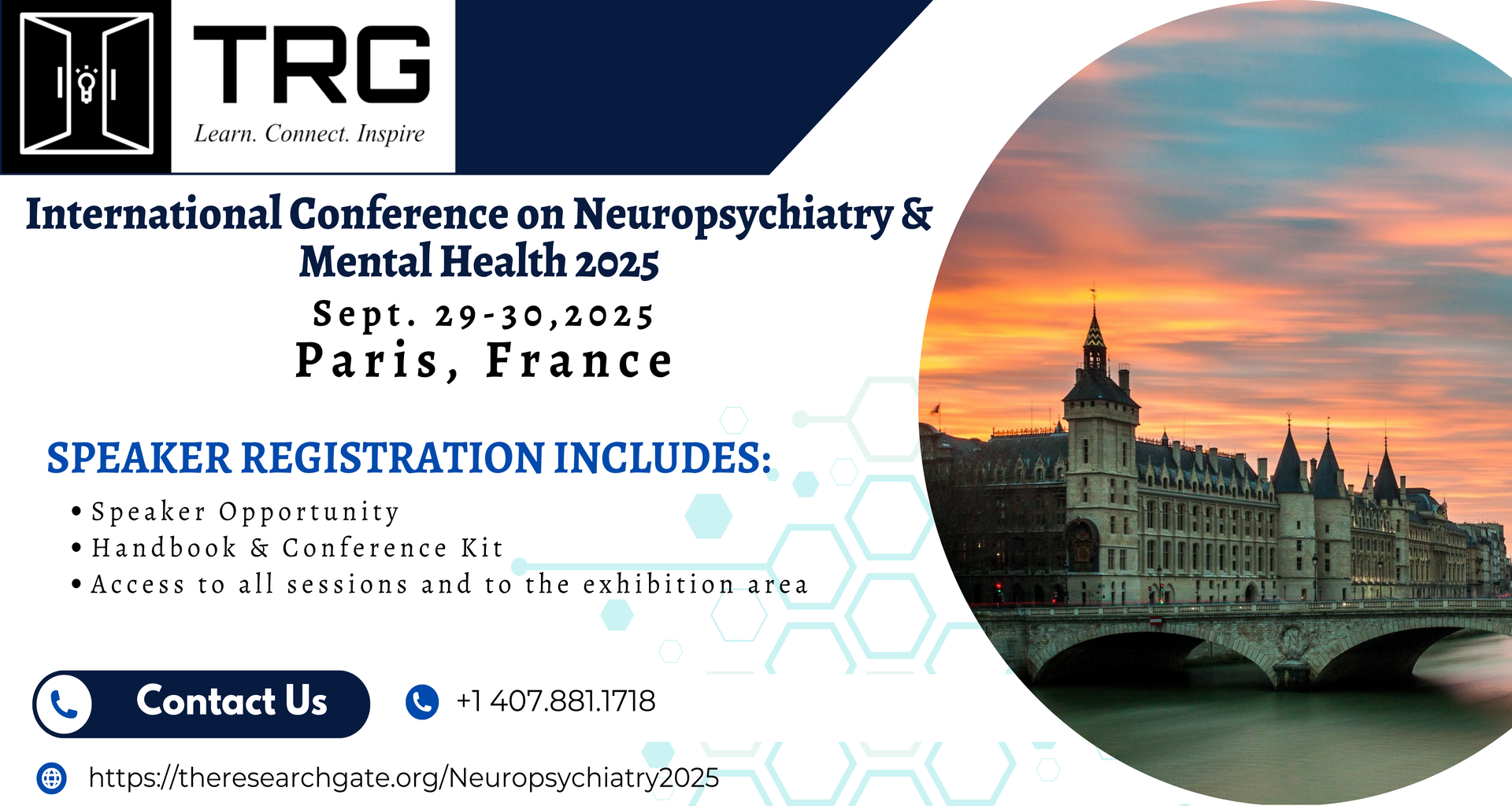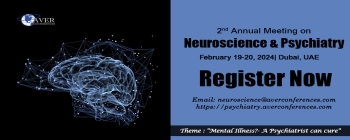
The Research Gate (TRG) creates an international platform for exchanging ideas and best practices in a manner that demonstrates respect for diversity and inclusion. TRG invites participants from the global healthcare community to attend the International Conference on Neuropsychiatry & Mental Health 2025 on September 29-30, 2025 in Paris, France. This conference will feature neurologists, neurosurgeons, psychiatrists, psychologists, neurobiologists, neuroimmunologists, and members of neurology organizations. The Neuropsychiatry & Mental Health 2025 strives to promote evidence-based strategies, increased collaboration among healthcare professionals, and improved quality of care to address the challenges of a rapidly changing healthcare environment.
Abstract Guidelines
- Title should be indicative of the content of the abstract. Avoid non standard abbreviations in abstract titles.
- Abbreviations may be used in the body of an abstract if they are defined at their first mention in the text.
- The combined length of the abstract title and body should not exceed 300 words. The title, authors, and institution list is not included in the character limit.
- Underline the main presenter and add e-mail contact.
- Please use Times New Roman/Arial (11pts).
Example:
Functional analysis of the PALB2 tumor suppressor
Amélie Rodrigue(1), Yan Coulombe(1), Guillaume Marguillan(2), Mandy Ducy(2), Penny Soucy(2), Anthony M. Couturier(1), Joris Pauty(1), Rémi Buisson(3), Niraj Joshi(1), Marie-Christine Caron(1), Lee Zou(3), Graham Dellaire(4), Marcelo Alex Carvalho(5), Alvaro Monteiro(6), Jacques Simard(2), and Jean-Yves Masson(1)
(1) Genome Stability Laboratory, CHU de Québec Research Center, Québec City, QC, G1R 2J6, Canada
(2) CHU de Québec Research Center, Québec City, QC, G1V 4G2, Canada
(3) Department of Pathology, Harvard Medical School, USA
(4) Department of Biochemistry & Molecular Biology, Dalhousie University, Canada
(5) Instituto Nacional de Câncer, Programa de Farmacologia, Rio de Janeiro, Brazil
(6) Cancer Epidemiology Program, H. Lee Moffitt Cancer Center and Research Institute, Florida, USA
Presenting author: Jean-Yves Masson(Jxxxxxxx@fmed.ulaval.ca)
Abstract: (Up to 300 words)
One typical mechanism to promote genomic instability, a hallmark of cancer, is to inactivate tumor suppressors, such as PALB2. Inherited mutations in PALB2 are associated with a predisposition for ovarian, breast and pancreatic cancers. In particular, it has been reported that mutations in PALB2 increase breast cancer risk up to 8-9-fold. PALB2 was identified BRCA2 interacting protein, essential for BRCA2 anchorage to nuclear structures and for its function in double-strand break repair. The basis of the tumorigenic potential of PALB2 is thought to be related to functions in homologous recombination. Our laboratory focuses on both the regulation and activities of PALB2 during the DNA damage response and the effect of cancer-causing mutations. First, we will present our work in deciphering the functions of PALB2 in homologous recombination. Second, predicting the functional consequences of PALB2 mutations or variants has been challenging as they can lead to different biological effects. Using a novel CRISPR/Cas based homologous recombination assay, biochemical and cellular assays, we performed a structure-function analysis of PALB2 using PALB2 truncated mutants (R170fs, L531fs, Q775X and W1038X) and several variants of uncertain significance. These studies allowed us to uncover a PALB2 regulation mechanism by which cancer cells could drive genomic instability. The assays presented here will be valuable tools for the functional assessment of PALB2 variants, or other homologous recombination genes, in cancer etiology.
Keywords: Eight to ten key words
Biography: (Up to 300 words)
Jean-Yves Masson is an internationally recognized expert in DNA repair mechanisms. His interest in DNA repair began during his PhD where he studied the function of base excision repair enzymes. He then completed his postdoctoral studies at Clare Hall laboratories to study DNA repair by homologous recombination using biochemical and cellular approaches. He was recruited at the Laval University Cancer Center in 2002 and became in 2013 the director of the Molecular Biology, Medical Biochemistry, and Pathology Department. He has over 140 publications in several high-impact journals such as Science, Nature Communications, and Molecular Cell. He is an Editor of Nucleic Acids Research, NAR cancer, Scientific Reports, and Biology direct and currently holds a Tier I Canada research chair in DNA repair and cancer therapeutics. Throughout his career, Dr. Masson focused on radiation and chemicals that impede DNA replication to induce DNA double-strand breaks (DSBs). Failure to remove these breaks leads to cell death, genetic mutations, gross chromosome rearrangements, and to cell transformation and cancer. He is one of the few world experts on PALB2, a protein which is getting scientific and public attention as PALB2 mutations increase breast cancer by 6-8 fold. Dr. Masson was recently inducted as a Canadian Academy of Health Sciences fellow.
Right click on the image and select change picture option to upload your recent photo (Please submit the high resolution headshot photograph on abstract submission page)
Presenter Name: Speaker Full Name
Type of Presentation: Keynote/Speaker/Poster/Sponsor
Work Email: Jxxxxxxx@fmed.ulaval.ca
Non-Work Email*: jxxxxxx@gmail.com
Work Phone Number*: +1-xxx-yyy-zzzz
Cell Number*: +1-xxx-yyy-zzzz
(*Emails & contact numbers are only used
to update about the conference)








